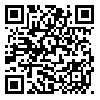Volume 11, Issue 4 (1398 2020)
2020, 11(4): 22-27 |
Back to browse issues page
Ethics code: IR.ZAUMS.RES.1396.353
Download citation:
BibTeX | RIS | EndNote | Medlars | ProCite | Reference Manager | RefWorks
Send citation to:



BibTeX | RIS | EndNote | Medlars | ProCite | Reference Manager | RefWorks
Send citation to:
Ghorbanzadeh M, Sarani A, Shahraki G, Gholami S, Nasimi F. The Relationship between Happiness with Perceived Stress during Labor and Maternity Blues. North Khorasan University of Medical Sciences 2020; 11 (4) :22-27
URL: http://journal.nkums.ac.ir/article-1-1965-en.html
URL: http://journal.nkums.ac.ir/article-1-1965-en.html
1- Department of Nursing, School of Nursing and Midwifery, North Khorasan University of Medical Sciences, Bojnurd, Iran
2- Department of Midwifery, Zahedan Branch, Islamic Azad University, Zahedan, Iran , saraniazade@gmail.com
3- Department of Midwifery, Zahedan Branch, Islamic Azad University, Zahedan, Iran
4- Department of Operating Room, School of Nursing and Midwifery, North Khorasan University of Medical Sciences, Bojnurd, Iran
5- Department of Nursing, School of Nursing and Midwifery, Kazerun Islamic Azad University, Kazerun, Iran
2- Department of Midwifery, Zahedan Branch, Islamic Azad University, Zahedan, Iran , saraniazade@gmail.com
3- Department of Midwifery, Zahedan Branch, Islamic Azad University, Zahedan, Iran
4- Department of Operating Room, School of Nursing and Midwifery, North Khorasan University of Medical Sciences, Bojnurd, Iran
5- Department of Nursing, School of Nursing and Midwifery, Kazerun Islamic Azad University, Kazerun, Iran
Abstract: (3352 Views)
Introduction: Delivery is a stressful event and maternity blues after delivery is most common postpartum mood disorder that happiness is one of the most important factor in coping with stress and depression. So, this study was performed with the aim to determine relationship between happiness and perceived stress during labor and maternity blues.
Methods: This descriptive correlational study was done in 2017 on 80 pregnant women referring to Taamin Ejtemaei hospital of Zahedan. At the time of referral, was completed Oxford happiness questionnaire and Cohen perceived stress questionnaire during labor and was completed Back depression questionnaire on the third and tenth days after delivery. Data was analyzed by Spss software (version 16) and Spearman/Pearson correlation coefficients and regression.
Results: The result of Pearson correlation coefficients showed a significant reverse correlation between happiness and perceived stress (P < 0.0001, r = - 0.88) and a significant reverse correlation between happiness and maternity blues of the third day (P < 0.0001, r = -0.92) and tenth day (P < 0.0001, r= - 0.90)
Conclusions: There is a relationship between happiness with perceived stress during labor and maternity blues after delivery. With higher levels of the happiness of pregnant women, the less stress will be felt during labor and they will be less affected by mood disorders and postpartum depression. Therefore, the provision of happiness for women can improve their mental health at the time of delivery and afterwards
Methods: This descriptive correlational study was done in 2017 on 80 pregnant women referring to Taamin Ejtemaei hospital of Zahedan. At the time of referral, was completed Oxford happiness questionnaire and Cohen perceived stress questionnaire during labor and was completed Back depression questionnaire on the third and tenth days after delivery. Data was analyzed by Spss software (version 16) and Spearman/Pearson correlation coefficients and regression.
Results: The result of Pearson correlation coefficients showed a significant reverse correlation between happiness and perceived stress (P < 0.0001, r = - 0.88) and a significant reverse correlation between happiness and maternity blues of the third day (P < 0.0001, r = -0.92) and tenth day (P < 0.0001, r= - 0.90)
Conclusions: There is a relationship between happiness with perceived stress during labor and maternity blues after delivery. With higher levels of the happiness of pregnant women, the less stress will be felt during labor and they will be less affected by mood disorders and postpartum depression. Therefore, the provision of happiness for women can improve their mental health at the time of delivery and afterwards
Type of Study: Orginal Research |
Subject:
Basic Sciences
Received: 2019/07/28 | Accepted: 2019/12/16 | Published: 2020/04/13
Received: 2019/07/28 | Accepted: 2019/12/16 | Published: 2020/04/13
Send email to the article author
| Rights and permissions | |
 |
This work is licensed under a Creative Commons Attribution-NonCommercial 4.0 International License. |






